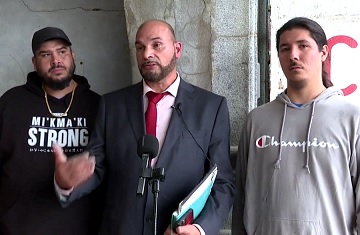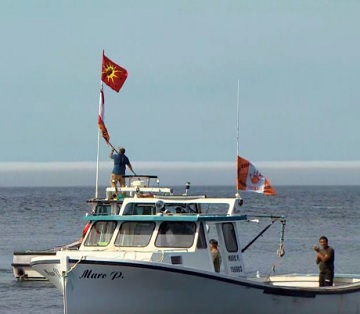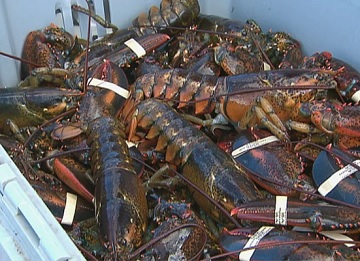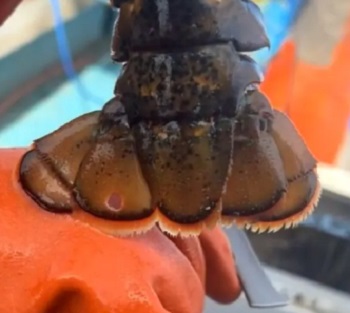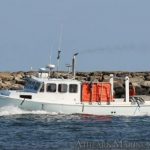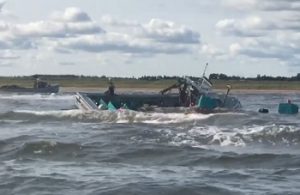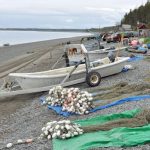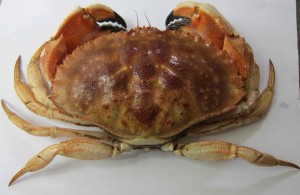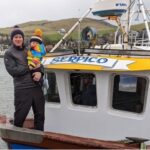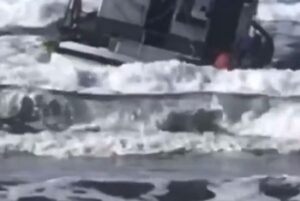Tag Archives: Sipekne’katik First Nation
Sipekne’katik claims ‘significant progress’ in talks with Ottawa over controversial N.S. lobster fishery
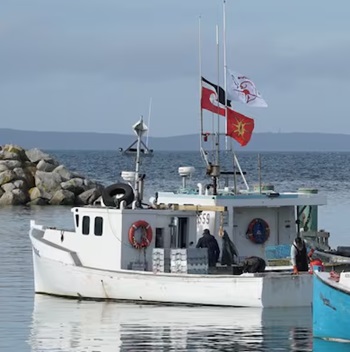 The First Nation at the centre of a highly contentious out-of-season lobster fishery in southwest Nova Scotia says mediation with the federal government is bearing fruit, with lengthy meetings between both sides leading to the first “meaningful dialogue” in 25 years. The comments from the lawyer for Sipekne’katik First Nation come in a letter to a Nova Scotia Supreme Court judge that asks that litigation launched by the band against the federal government in 2021 be paused for another six months to allow negotiations to continue. The two sides, along with intervenor Unified Fisheries Conservation Alliance, which represents commercial fishing interests, are expected to discuss the time extension in court this morning. more, >>CLICK TO READ<< 08:02
The First Nation at the centre of a highly contentious out-of-season lobster fishery in southwest Nova Scotia says mediation with the federal government is bearing fruit, with lengthy meetings between both sides leading to the first “meaningful dialogue” in 25 years. The comments from the lawyer for Sipekne’katik First Nation come in a letter to a Nova Scotia Supreme Court judge that asks that litigation launched by the band against the federal government in 2021 be paused for another six months to allow negotiations to continue. The two sides, along with intervenor Unified Fisheries Conservation Alliance, which represents commercial fishing interests, are expected to discuss the time extension in court this morning. more, >>CLICK TO READ<< 08:02
In once tranquil N.S. town, intimidation in the lobster industry now all too common
 Standing by a bullet hole in his dining room wall, lobster buyer Geoffrey Jobert says such attacks have become an all-too-familiar reality in Nova Scotia’s largest fishery. The 30-year-old and his younger brother came to the area from Halifax to take over his father’s processing plant five years ago and now employ 100 people. He’s enjoyed making friends in the francophone town and paddling along a stunning beach near his home when he has a few spare hours. But last year, threats started after he agreed to buy the catch of a licensed, commercial harvester who was no longer willing to provide his catch to facilities allegedly purchasing illegally caught lobster. And Jobert soon learned he wasn’t the only person in the communities along the Acadian shore who experienced late-night attacks. more, >>CLICK TO READ<< 06:35
Standing by a bullet hole in his dining room wall, lobster buyer Geoffrey Jobert says such attacks have become an all-too-familiar reality in Nova Scotia’s largest fishery. The 30-year-old and his younger brother came to the area from Halifax to take over his father’s processing plant five years ago and now employ 100 people. He’s enjoyed making friends in the francophone town and paddling along a stunning beach near his home when he has a few spare hours. But last year, threats started after he agreed to buy the catch of a licensed, commercial harvester who was no longer willing to provide his catch to facilities allegedly purchasing illegally caught lobster. And Jobert soon learned he wasn’t the only person in the communities along the Acadian shore who experienced late-night attacks. more, >>CLICK TO READ<< 06:35
Sipekne’katik First Nation granted a temporary adjournment to allow for mediation with the Crown
 A Nova Scotia Supreme Court judge has granted a joint request from the Sipekne’katik First Nation and the Attorney General of Canada to adjourn trial dates that would have aimed to settle treaty fishing rights disputes. The court has decided to give the involved parties until December 12, 2024, to have a defined and active mediation process in place, if not, proceeding with litigation would be re-examined. The Unified Fisheries Conservation Alliance (UFCA), which represents the interests of its members who are commercial fishers in the Gulf and Maritimes regions, asserts that the courts must finally decide the scope of Marshall rights for Indigenous Peoples. “The fact that the Sipekne’katik First Nation is attempting to settle treaty fishing rights issues outside of court is a historic precedent considering the court system has been at the center of Indigenous claims to the fishery and rights in particular for decades,” said Colin Sproul, President of the UFCA. more, >>CLICK TO READ<< 15:25
A Nova Scotia Supreme Court judge has granted a joint request from the Sipekne’katik First Nation and the Attorney General of Canada to adjourn trial dates that would have aimed to settle treaty fishing rights disputes. The court has decided to give the involved parties until December 12, 2024, to have a defined and active mediation process in place, if not, proceeding with litigation would be re-examined. The Unified Fisheries Conservation Alliance (UFCA), which represents the interests of its members who are commercial fishers in the Gulf and Maritimes regions, asserts that the courts must finally decide the scope of Marshall rights for Indigenous Peoples. “The fact that the Sipekne’katik First Nation is attempting to settle treaty fishing rights issues outside of court is a historic precedent considering the court system has been at the center of Indigenous claims to the fishery and rights in particular for decades,” said Colin Sproul, President of the UFCA. more, >>CLICK TO READ<< 15:25
Sipekne’katik First Nation, federal government to begin mediation in effort to settle fishing dispute
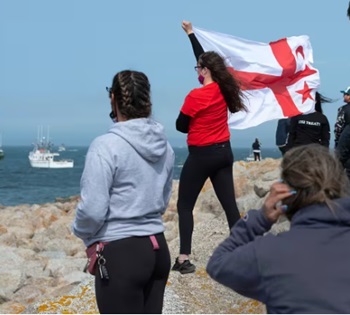 Litigation scheduled for next year that could have helped settle outstanding questions about treaty fishing rights related to the Marshall decisions will no longer happen, after a Nova Scotia Supreme Court judge granted a joint request from Sipekne’katik First Nation and the Attorney General of Canada to instead focus on mediation. The decision stems from a lawsuit Sipekne’katik filed in 2021 that wanted a declaration from the court that the federal Fisheries Act and regulations infringe on the treaty right to fish lobster for a moderate livelihood. That includes the prohibition on catching and holding lobsters without a licence and fishing outside of a commercial season. The trial was to start in May 2025, but this April, just as witness discovery was set to begin, the two parties served notice to the court that they’d reached an agreement to focus instead on mediation. They filed a joint request to have the trial dates and all other pretrial milestones adjourned. more, >>CLICK TO READ<< 12:37
Litigation scheduled for next year that could have helped settle outstanding questions about treaty fishing rights related to the Marshall decisions will no longer happen, after a Nova Scotia Supreme Court judge granted a joint request from Sipekne’katik First Nation and the Attorney General of Canada to instead focus on mediation. The decision stems from a lawsuit Sipekne’katik filed in 2021 that wanted a declaration from the court that the federal Fisheries Act and regulations infringe on the treaty right to fish lobster for a moderate livelihood. That includes the prohibition on catching and holding lobsters without a licence and fishing outside of a commercial season. The trial was to start in May 2025, but this April, just as witness discovery was set to begin, the two parties served notice to the court that they’d reached an agreement to focus instead on mediation. They filed a joint request to have the trial dates and all other pretrial milestones adjourned. more, >>CLICK TO READ<< 12:37
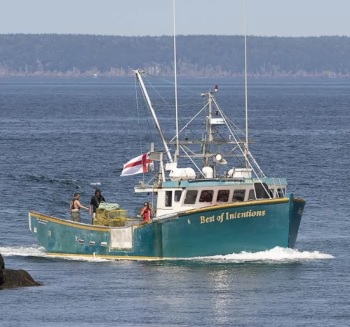
More than 50 Indigenous fish harvesters in the Maritimes charged or on trial
Three years after a First Nation started a self-regulated lobster fishery that sparked protests and violence in Nova Scotia, federal prosecutors are pressing ahead with charges against dozens of Indigenous fishers, some of whom are planning constitutional challenges. On Sept. 17, 2020, the Sipekne’katik First Nation issued five lobster licences to its members, saying they could trap and sell their catch outside the federally regulated season. The bold move came exactly 21 years after the Supreme Court of Canada affirmed the treaty right of Indigenous groups in Eastern Canada to hunt and fish for a moderate livelihood, but interpretations of that landmark ruling remain in dispute. >>click to read<< 09:25
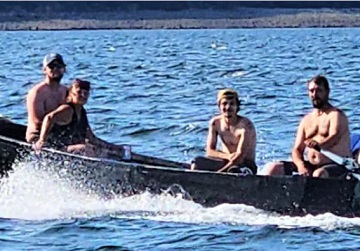
Nova Scotia fishers, Indigenous stakeholders call for more dialogue amid violence
As Nova Scotia RCMP continues to investigate violence on a wharf in St. Mary’s Bay, stakeholders on both sides are calling for more conversation instead of violence. The Maritime Fishermen Union called on all levels of government, including fishers on both sides to get to the table. “Our largest concern is the conservation of the stock on St. Mary’s Bay,” Ruth Inniss, a fisheries adviser with the Maritime Fishermen Union, said. “We tried to bring all the players of the problem to the table to solve the problem. The problem clearly hasn’t been solved.” Video, >>click to read<< 09:04
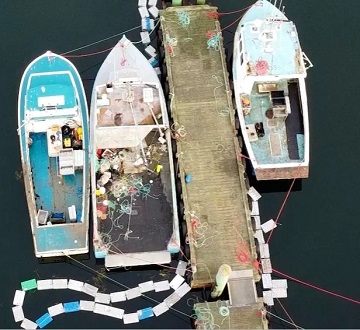
‘Enforce the laws’: N.S. Liberals to feds, province on lobster dispute
As the conflict over Sipekne’katik’s moderate livelihood fishery once again heats up in St. Marys Bay, the provincial Liberal party has split from their federal counterparts. On Tuesday, Nova Scotia Liberal Leader Zach Churchill called for the provincial government to start revoking the licences of any buyers found to be purchasing lobster caught without a licence issued by Fisheries and Oceans Canada (DFO). And he called out the federal government for a lack of enforcement of the Fisheries Act. “We are talking about hundreds of thousands or millions of dollars of lobster being landed illegally. There has to be a disincentive. … DFO also has to enforce the laws of the land which prohibit large-scale poaching.” >>click to read<< 12:34
RCMP investigate assault, theft from First Nation lobster harvester near Digby
 RCMP in Digby, N.S., are looking for suspects in an alleged theft and assault of a lobster harvester from the Sipekne’katik First Nation earlier this month in St. Mary’s Bay. The Mounties say four people stole a crate full of lobster worth $400 from a boat at the Weymouth North wharf near Digby on Aug. 2. When confronted by the owner, a Sipekne’katik woman, they dumped the lobster into the water and allegedly threw the empty crate at the owner hitting her on the arm. The victim was uninjured. The details released by the RCMP match those in an incident described by Sipekne’katik harvester Sheyanne Francis and captured in a video by Indigenous broadcaster APTN. >>click to read<< 22:03
RCMP in Digby, N.S., are looking for suspects in an alleged theft and assault of a lobster harvester from the Sipekne’katik First Nation earlier this month in St. Mary’s Bay. The Mounties say four people stole a crate full of lobster worth $400 from a boat at the Weymouth North wharf near Digby on Aug. 2. When confronted by the owner, a Sipekne’katik woman, they dumped the lobster into the water and allegedly threw the empty crate at the owner hitting her on the arm. The victim was uninjured. The details released by the RCMP match those in an incident described by Sipekne’katik harvester Sheyanne Francis and captured in a video by Indigenous broadcaster APTN. >>click to read<< 22:03
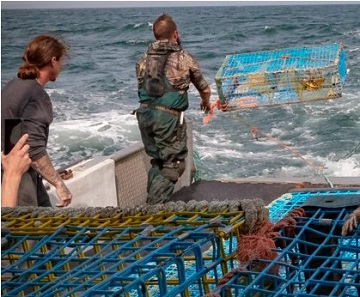
Sipekne’katik First Nation sues federal government for seizing lobster traps
The Sipekne’katik First Nation in Nova Scotia is suing the federal government over treaty right infringement after officers with the Department of Fisheries and Oceans seized lobster traps belonging to its band members. Sipenkne’katik alleges that DFO fishery officers hauled lobster traps belonging to two of its band members from waters in St. Mary’s Bay near Saulnierville, N.S. July 18-19. In a statement of claim that was filed at Nova Scotia Supreme Court in Halifax on July 24, Sipekne’katik states that its members have a treaty right to fish for a moderate livelihood which “means they have a right to sell the lobster they catch.” >click to read< 11:34
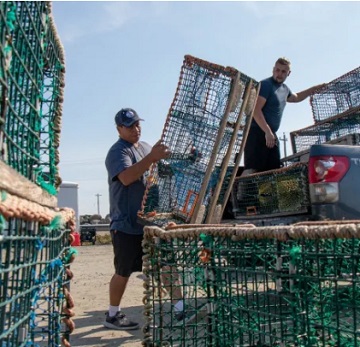
DFO says it has enough resources to monitor Indigenous lobster fishing in Nova Scotia
Fisheries and Oceans Canada (DFO) says its enforcement branch will be on the water and adequately equipped to monitor compliance of First Nations lobster fisheries this summer. The pledge follows the chaotic fishery for baby eels this spring where there was widespread illegal activity by some Indigenous and non-Indigenous harvesters. DFO shut down the legal elver fishery, affecting both commercial licence holders and Indigenous groups with fishing plans approved by the department. But “poaching”, as federal Fisheries Minister Joyce Murray called it, continued. “I want to clarify they are two very different fisheries,” Maritimes region director of conservation and protection Tim Kerr told reporters Monday in a briefing on Indigenous rights-based lobster fisheries. >click to read< 08:35
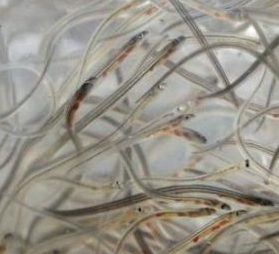
For Atlantic Canada, Fishing Season Brings Yet More Violence
In the early morning dark of April 12, 2023, violence erupted along a Nova Scotia riverbank after a man engaged a woman and a youth in a heated argument. Soon after, seven people arrived. One allegedly assaulted the man with a pipe while another stood nearby wielding a knife and a taser. When the RCMP later arrested two members of the group a short distance away, the officers found two shotguns and a taser. Conflict around elvers is not new, nor is it the only fishery in Atlantic Canada that’s seen so much turmoil. Whether it’s around elvers, lobsters, or something else, “this will continue to play out, and play out, and play out, until the government deals with the issues on the table.” >click to read< 08:05
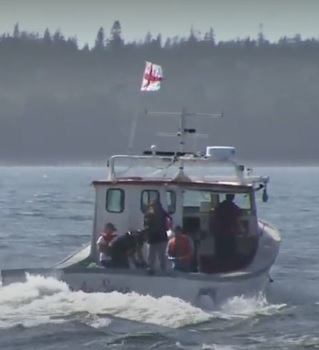
Conflict over new Indigenous lobster fishery continues to smolder amid some progress
Federal conservation officers have seized more than 7,000 lobster traps in the two years since violence flared in Nova Scotia when a First Nation tried to assert a treaty right by fishing out of season. Earlier this month, the Department of Fisheries and Oceans confirmed it had confiscated almost 2,000 traps this year alone, a figure that shows the dispute between Ottawa and some Indigenous fishers has not gone away, despite DFO’s best efforts to keep a lid on tensions. Tim Kerr, DFO’s director of conservation and protection in the Maritimes, said the department has stepped up patrols in the region to ensure safety and compliance with the rules. >click to read< 12:00
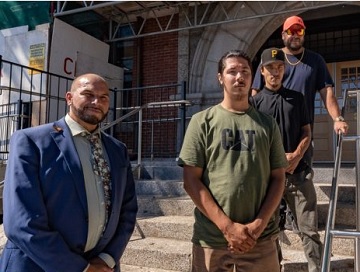
Moderate livelihood treaty right at centre of fishery trial in Nova Scotia
A trial involving three Mi’kmaw fishermen who say they were exercising their treaty right to fish for a living when they were charged with fishery offences is currently underway in Digby, N.S. James Nevin, 38, Logan Pierro-Howe, 24, and Leon Knockwood, 27, from the Sipekne’katik First Nation are each charged with four counts of violating the Aboriginal Communal Fishing Licenses Regulations and the Atlantic Fishery Regulations under the Fisheries Act. They’re accused of fishing and catching lobster without authorization as well as possessing lobster traps that either had unauthorized tags or no tags on them. >click to read< 08:10
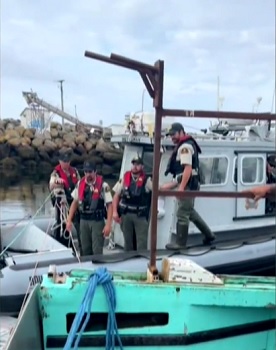
Mi’kmaw treaty lobster fishery launches, fisheries officers seize lobster and gear
Fisheries officers seized crates of lobster at Saulnierville wharf, harvested by Sipekne’katik First Nation fishermen. A few days earlier, Mi’kmaw fishermen dropped their lobster traps in St. Mary’s Bay under the band’s own lobster management plan. The federal Department of Fisheries and Oceans confirmed that officers seized 82 crates containing approximately 6,000 lobster. Robert Sack of Sipekne’katik First Nation says his gear was also seized – but he will keep fishing, A day before the treaty fishery launched, James Nevin, of Sipekene’kaitk was in Digby provincial court, defending his treaty rights to harvest lobster to earn a moderate livelihood. >click to read< 11:34

Removing DFO from Indigenous fishery negotiations an ‘integral’ step forward
Chief Mike Sack of the Sipekne’katik First Nation said the report, titled Peace on the Water, validates what he and his band have been saying about their right to fish since they launched a moderate livelihood fishery two years ago. The report calls for negotiations involving the Indigenous fishery to be handled by Crown-Indigenous Relations and Northern Affairs Canada, which Sack described as “the most integral” of the committee’s recommendations. “The treaty fishery model we presented over two years ago now is reinforced by each recommendation from the Senate,” Sack said in a statement. >click to read< 13:52
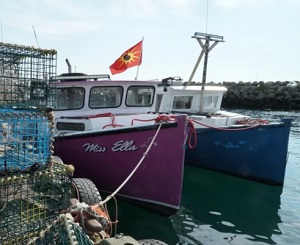
Canada responds to United Nations after Mi’kmaw treaty fishery complaint
Canada submitted its response last month to a United Nations committee after Sipekne’katik First Nation in Nova Scotia asked the international body to investigate violence against Mi’kmaw fishers during the “moderate livelihood” lobster fishery in the fall of 2020. However, the federal Heritage Department, which is the lead agency handling the human rights reporting file, said Canada’s submission will remain confidential. >click to read< 19:16

Mi’kmaw fisher won’t participate in restorative justice process
A plan by Crown prosecutors to put a restorative justice process in place for non-Indigenous fishermen accused of assault and arson will not include the Mi’kmaw fisher who was surrounded by a mob while he was inside a lobster pound. The Mi’kmaw fisherman who has not spoken to the media about the process has told the Crown he wants nothing to do with the process. Almost two years ago, lobster harvesters from Sipekne’katik First Nation exercised their treaty right to fish, launched their self-regulated fishery at Saulnierville wharf, in southwestern Nova Scotia. “It’s a double standard it’s unreal,” says Sipekne’kativ First Nation Chief Mike Sack. “I don’t even like using the word Canadian anymore.” Sack says he doesn’t believe justice will be served by going this route. Video, >click to read< 07:33

Restorative justice to be used in resolving charges in ransacking Nova Scotia lobster pound
Restorative justice is being used to help resolve a case involving 25 people accused of ransacking a Nova Scotia lobster pound at the centre of a dispute over Indigenous fishing rights. The Pubnico pound was storing lobster caught by members of the Sipekne’katik First Nation, which angered commercial fishers because the harvest was conducted outside the federally regulated season. Reached for his reaction to Friday’s development, Sipekne’katik Chief Mike Sack expressed surprise and called the referral to restorative justice a “cop out” and a way for the accused to avoid consequences. Video, >click to read< 07:38
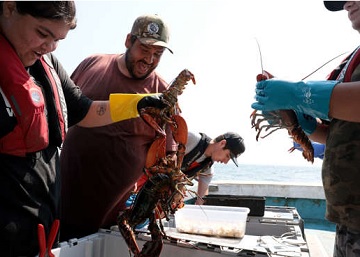
As lobster population booms off Canada, tensions rise between Indigenous and commercial fishermen
Under the close watch of federal officers on surrounding patrol vessels, Robert Sack navigated his old boat toward his clandestine traps in the cold waters that his people have fished for centuries, expecting to be arrested at any moment.,, Each trap had a special tag belonging to their band of the Indigenous Mi’kmaw people, who insist that a 269-year-old treaty grants them the right to fish when and how they want. But the government has rejected their assertion, and officers have seized their traps, confiscated their boats, and even arrested some of their fishermen. >click to read< 07>14

UFCA President Says Important Days Coming In Court
The group representing 2,000 commercial fishing stakeholders in Nova Scotia and New Brunswick have been granted intervener status in several Indigenous court cases. The latest came in December in a notice of application brought forward by the Sipekne’katik First Nation to the Supreme Court of Canada. The band’s application is against the federal government, challenging their regulation and enforcement of Indigenous fisheries. UFCA President Colin Sproul says these are the most vital court cases since the Marshall Decision. He says the UFCA’s goal is to have one set of rules for all fishers, within established seasons, and they are committed to a peaceful solution with all parties involved. >click to read< More UFCA >click< 14:26

Nova Scotia: Prosecutors add charges for 25 in lobster pound riot
Prosecutors have added more charges against 25 people accused of entering and ransacking a Nova Scotia lobster pound at the centre of a dispute about an Indigenous self-regulated fishery. Crown lawyer Robert Kennedy, however, said in an interview Tuesday the prosecution is willing to discuss “resolutions” for “at least some” of the accused, which would avoid further court proceedings. In January 2021, the RCMP announced that 23 people were facing a charge of break and enter, with eight also charged with mischief, for their roles in the Oct. 14, 2020, incident at the facility in Middle West Pubnico, N.S. >click to read< 14:55
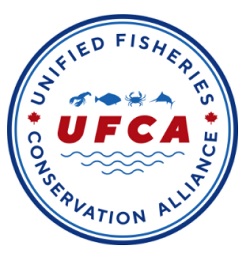
UFCA Granted Intervenor Status In Sipekne’katik Court Case
The Unified Fisheries Conservation Alliance has been granted intervenor status in another court case involving indigenous fisheries. They will be part of the Notice of Application brought by the Sipekne’katik First Nation against the Attorney General of Canada to challenge the regulation and enforcement of Indigenous fishing activities. UFCA President Colin Sproul discusses why it’s important for them to be involved. >click to read< 09:12

Sipekne’katik chief ‘optimistic’ about newly appointed fisheries minister
The chief of Sipekne’katik First Nation in Nova Scotia says he’s looking forward to a clean slate with the newly appointed fisheries minister. MP Joyce Murray, who represents Vancouver Quadra, was named minister of fisheries and oceans when Justin Trudeau unveiled his new cabinet Tuesday.,, Mike Sack said since the federal election, he has been “waiting patiently” for Trudeau to name a new minister. He adds he plans to reach out to Murray soon for a one-on-one chat. >click to read< 10:33

A year ago violence erupted in the lobster fishery, “moderate livelihood” fishery status unresolved
One year ago, confrontation and violence upended the normally business-like commercial lobster season in St. Mary’s Bay and Lobster Fishing Area 35 in southwest Nova Scotia. Tensions between Indigenous and non-Indigenous fishermen in the bay had erupted in several dangerous boat-ramming incidents.,, But a full year later, as the wheels of justice turn ever so slowly, none of those charged have entered a plea. Before we examine how that happened, it’s worth noting some updates in the troubled fishery. >click to read< 10:07
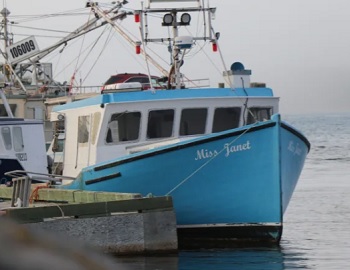
The body of a missing fisherman was found off Yarmouth
The body of a missing fisherman has been found off the coast of Yarmouth, N.S. The Joint Rescue Coordination Centre said the 52-year-old was found at 2 p.m. AT Friday by search and rescue personnel. JRCC spokesperson Lt.-Cmdr. Brian Owens offered his condolences to the family, friends and community of the fisherman. The man was the captain of a fishing vessel identified as the Miss Janet, which was travelling from Shelburne to Saulnierville. The man’s identity has not been released at the request of his family. Our condolences. >click to read< 15:54

UPDATED: Search continues for 54-year-old missing fisherman off Yarmouth
Crews with the Joint Rescue Coordination Centre are searching for a missing fisherman in the waters off southern Nova Scotia. The centre said they were notified at about 4 a.m. AT of a man who had gone overboard from a fishing vessel about 27 kilometres off the coast of Yarmouth, N.S. Lt. Cmdr. Brian Owens said there were initially four people on board the vessel. Three of them went to sleep, leaving the captain in the wheelhouse. The band office of the Sipekne’katik First Nation confirmed the missing man is a member of the community. Several fishermen from Sipekne’katik were out on the water assisting in the search Thursday. >click to read< 17:32






